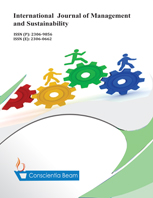The role of organizational culture in the performance of SMEs in Vietnam during the economic crisis
DOI:
https://doi.org/10.18488/11.v13i2.3737Abstract
This study examines whether the financial crisis caused by the COVID-19 pandemic and the economic downturn will affect the role of organizational culture in the performance of SMEs in Vietnam. Specifically, the study aims to evaluate changes in the OC of SMEs during and after the crisis. Survey data used for analysis includes 202 SMEs in Vietnam. It was collected from January 2023 to March 2023. The research used the Denison culture model. SmartPLS 4.9.0.2 software was used to test the research model and compare cultural changes before and during the crisis. The findings suggest that organizational culture has a positive relationship with both accounting information systems (AIS) and organizational performance, but only adaptability affects corporate performance. Furthermore, AIS is positively related to the corporate performance of SMEs. The study shows that organizational culture, including involvement, consistency, and mission, is eroded during a crisis, supporting the theory that economic crises hurt corporate culture. Additionally, repeated research confirms that organizational culture positively affects AIS and that AIS positively affects organizational performance regardless of economic crisis. The results provide indicators for managers on how to promote sustainable business development. It is important for SMEs to establish a cultural identity that aligns with their goals and strategies to minimize conflicts of interest and improve competitiveness.

